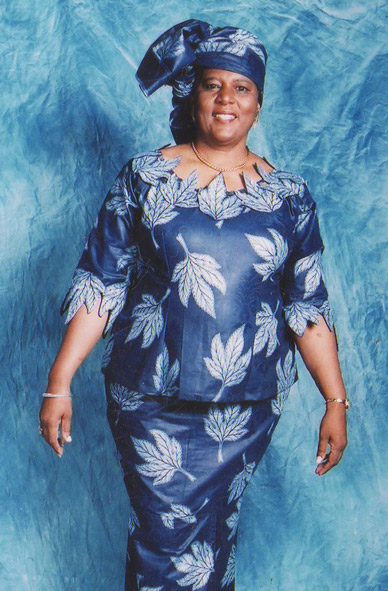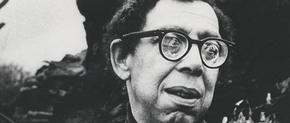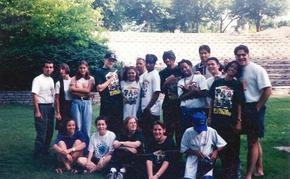The views expressed in our content reflect individual perspectives and do not represent the authoritative views of the Baha'i Faith.
“I’m Sandy Parr,” she said, smiling and sticking out her hand to shake mine, “just a girl from Watts.”
Sandy Parr had that special exuberant spark, that twinkle in her eye that let me know I had met someone unique, enthusiastic and filled with life.
On that particular night, at a Baha’i fireside in Los Angeles, we were both seventeen years old, both high school students and both spiritual seekers investigating the Baha’i Faith. Within a few months, we would both declare our belief in Baha’u’llah, and start our journeys as Baha’is in this hard world.
We had no way of knowing, either of us, that we would soon be thrown in jail together, or that Sandy would one day become an African queen.

Sandy Tjitendero
Sandy and I became buddies the night we first met, a black girl from the ghetto in Watts (OK, West 83rd and Van Ness—close enough) and a white boy from Arizona. For some reason, we bonded. Maybe it was our stern alcoholic fathers that gave us something in common, or our mutual love of soul music, or more likely the similar path we both walked in discovering and embracing the Baha’i teachings at the same time. For whatever reason, or all of them, we connected with each other right away, becoming lifelong friends.
About a year later, Sandy living in Bogalusa, Louisiana and me newly drafted into the Army and stationed in Alabama, she called and invited me to come speak at a Baha’i fireside at her home. I went, driving across three states, and while we were out buying groceries for the meeting that Saturday night, a Bogalusa policeman pulled us over and took us to jail. Why? We had no idea. We found out when we got to the police station, though.
“Are you two X&#^! civil rights workers?!” the young white cop screamed at us through the cell bars. He and three others, enraged at the sight of a black girl and a white guy walking down the street together in the Deep South, spent the next four hours yelling questions, nasty inferences and obscene insults at us both. Then they started to slap me around, kicking and punching. All four of them had little silver KKK emblems pinned to their uniforms. We thought we might not get out of that jailhouse alive—Schwerner, Chaney and Goodman, the civil rights workers who had recently died at the hands of the Ku Klux Klan and a Mississippi local police force, were still fresh in our minds.
“We’re Baha’is,” Sandy fearlessly told the cops. “We believe in the oneness of humanity.” That made them even madder. For a while there, I eyed the graveyard behind the jail through my cell window and wondered if it would be our final resting place.
The only thing that saved us? At about five in the afternoon the captain walked in. He immediately saw that he had interrupted something illegal and ill-advised, and he angrily cut us loose. “Don’t ever come back to my town again,” he told me, furious. I definitely haven’t returned to Bogalusa—but I didn’t leave until the fireside had finished later that night.
Within a few years, Sandy had gone to the University of Massachusetts and met the love of her life, a Namibian man from the Herero tribe named Mose Tjitendero, the chief of his tribe and a leader in SWAPO, the South West Africa People’s Organization. SWAPO, an ally of Nelson Mandela’s African National Congress, had spent many decades fighting for the freedom and self-determination of apartheid-era South West Africa, the de facto fifth province of South Africa. After a long struggle, from 1966 to 1990, Mose and his compatriots won, the apartheid regime fell, and Mose became the Founding Speaker of the National Assembly of the new nation of Namibia, until he retired fourteen years later. He also served as the Vice-Chair of the Inter-Parliamentary Union, the focal point for world-wide parliamentary dialogue first established in 1889. The IPU works for peace and co-operation among peoples and for the firm establishment of representative democracy around the globe.
As the wife of such a well-known leader, Sandra Tjitendero became a beloved figure in that new nation. Her radiant countenance, her universal caring for others, her work on behalf of the new country, her steadfast devotion to the Baha’i principles of unity and love for all, endeared her to the entire population of Namibia. She took in orphans and raised them, including the children of assassinated comrades; she helped run feeding and housing programs for the poor; she taught at the University of Namibia; with her beaming smile and big heart she exemplified the Baha’i principle of the oneness of humanity.
When Sandy returned to California we would get together and laugh—she had a great, full-bodied, hearty laugh—and I had the privilege of getting to know Mose fairly well during those visits, too. During his exile, he was the Assistant Director of the UN Institute for Namibia in Lusaka, Zambia. Once, during that long pre-independence exile in Zambia and Tanzania, Mose brought along a marked-up copy of the new Namibian Constitution, which he had helped write, and asked me if I had any suggestions. We sat in a café near the beach in Venice and talked about how to create a new country.
Sandy, I noticed on that trip, had become truly bi-continental, a living bridge between Africa and the West, with her sunny California disposition and her noble dignity, heightened by the beautiful West African robes she now wore. “Getting pretty fancy, there,” I joked with her. “But I know you’re just a girl from Watts.” She laughed that beautiful laugh for at least five minutes.
My dear friend Sandy died unexpectedly a few weeks ago. With these words from Abdu’l-Baha reminding me of her, I know that she’s laughing still:
She rose up into the shadowing mercy of God and was plunged in an ocean of light. Unto her be salutations and praise, compassion and glory. May God make sweet her resting-place with the outpourings of His heavenly mercy… – Abdu’l-Baha, Memorials of the Faithful, p. 174.

















Comments
Sign in or create an account
Continue with Facebookor